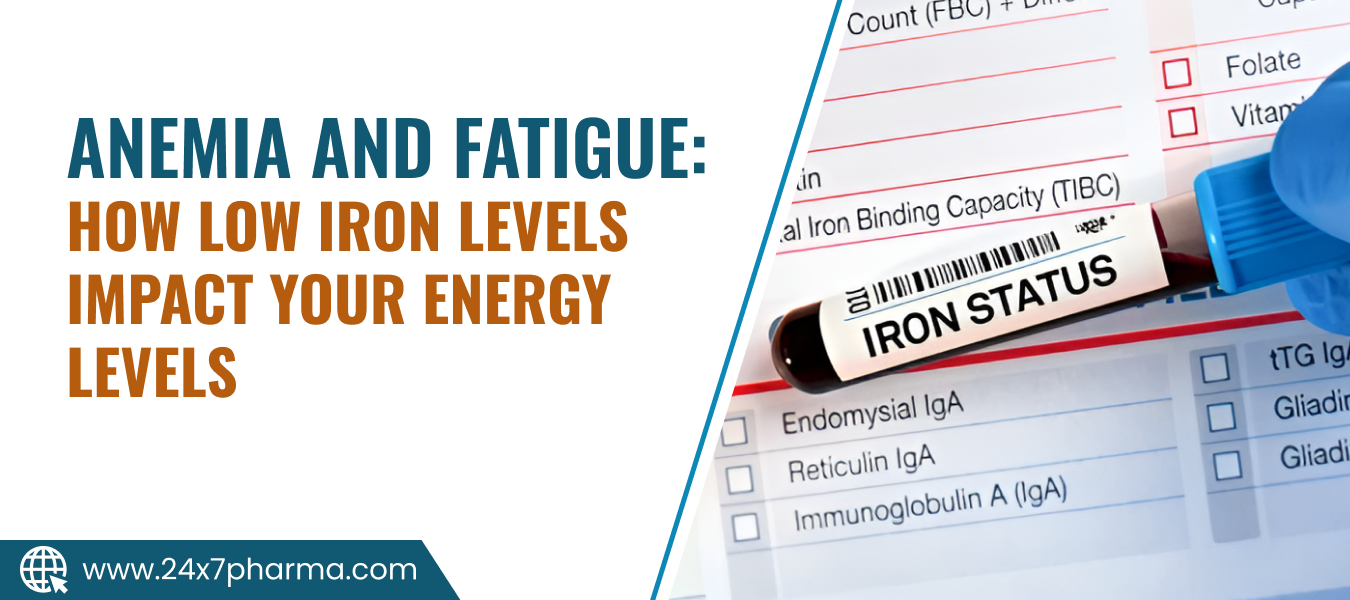Do you often feel exhausted, sluggish, or out of breath, even after a good night’s sleep? If so, your iron levels could be to blame. Iron is an essential mineral that plays a crucial role in energy production, and when it runs low, your body struggles to function optimally. Anemia, a condition characterized by a deficiency in red blood cells or hemoglobin, often stems from low iron levels and can lead to persistent fatigue and weakness.
Understanding Anemia and Iron Deficiency
Anemia occurs when your blood lacks enough healthy red blood cells to transport oxygen efficiently throughout your body. The most common type, iron-deficiency anemia, results from insufficient iron levels needed to produce hemoglobin—a protein in red blood cells responsible for carrying oxygen.
Without adequate hemoglobin, your body struggles to deliver oxygen to muscles and tissues, leading to fatigue, dizziness, and shortness of breath. Over time, low iron levels can also affect brain function, immune health, and overall energy levels.
Symptoms of Low Iron Levels
Iron deficiency anemia manifests through several symptoms, many of which directly impact energy and daily performance. If you’re experiencing any of the following, it may be time to check your iron levels:
- Chronic Fatigue and Weakness: The most common symptom, caused by reduced oxygen supply to muscles and tissues.
- Shortness of Breath: Even mild physical activity can leave you gasping for air due to inadequate oxygen circulation.
- Dizziness and Headaches: Reduced oxygen in the brain can cause frequent headaches and dizziness.
- Pale Skin and Brittle Nails: Hemoglobin gives blood its red color, so low levels can result in paleness.
- Cold Hands and Feet: Poor circulation due to anemia may lead to temperature sensitivity.
- Irregular Heartbeat: The heart has to work harder to pump oxygen-rich blood, leading to palpitations.
Ignoring these symptoms can worsen iron deficiency and significantly impact your quality of life.
How Iron Deficiency Leads to Fatigue
Fatigue associated with iron deficiency anemia isn’t just about feeling tired—it’s a deep, persistent exhaustion that affects every aspect of life. Here’s how it happens:
- Decreased Oxygen Delivery: Low hemoglobin levels mean less oxygen reaches your muscles and organs, making even simple tasks feel strenuous.
- Impaired Brain Function: Oxygen is crucial for cognitive function. Without enough of it, concentration, memory, and problem-solving skills can decline.
- Increased Heart Rate: To compensate for oxygen deficiency, the heart works harder, leading to rapid heartbeat and fatigue.
- Energy Metabolism Disruption: Iron plays a key role in producing ATP (adenosine triphosphate), the body’s primary energy source. Low iron disrupts this process, leading to sluggishness.
Causes of Iron Deficiency Anemia
Several factors contribute to iron deficiency anemia. Understanding these can help you take preventive measures:
- Poor Diet: A diet lacking iron-rich foods like lean meats, leafy greens, and beans can lead to low iron levels.
- Blood Loss: Heavy menstrual periods, ulcers, or internal bleeding can deplete iron stores.
- Pregnancy: Pregnant women need more iron to support fetal development, making deficiency common.
- Inability to Absorb Iron: Conditions like celiac disease, Crohn’s disease, or gastric bypass surgery can hinder iron absorption.
Read More : The Role of Vitamin B12 and Folate in Preventing Anemia
Diagnosing and Treating Low Iron Levels
If you suspect anemia, a blood test measuring hemoglobin and ferritin levels can confirm it. Once diagnosed, treatment may involve dietary changes, supplements, or medical intervention.
Best Dietary Sources of Iron
Iron is found in two forms: heme iron (animal-based) and non-heme iron (plant-based). Here are the best sources:
- Heme Iron (Highly Absorbable):
- Lean red meat (beef, lamb)
- Poultry (chicken, turkey)
- Seafood (salmon, tuna, oysters)
- Non-Heme Iron (Plant-Based):
- Spinach, kale, and other leafy greens
- Legumes (lentils, chickpeas, beans)
- Fortified cereals and tofu
- Nuts and seeds (pumpkin seeds, cashews)
Iron Supplements: When Are They Needed?
For individuals with severe deficiencies, iron supplements may be recommended. However, they should only be taken under medical supervision, as excessive iron can lead to toxicity and digestive issues.
Boosting Iron Absorption
To maximize iron intake, consider these tips:
- Pair iron-rich foods with Vitamin C (citrus fruits, bell peppers) to enhance absorption.
- Avoid iron inhibitors like coffee, tea, and dairy during meals, as they can block absorption.
- Cook with cast-iron cookware to increase iron content in food.
Lifestyle Tips to Boost Energy Levels
Beyond increasing iron intake, adopting healthy habits can help manage anemia-related fatigue:
- Stay Hydrated: Dehydration can worsen fatigue and slow down circulation.
- Get Regular Exercise: Low-impact exercises like walking, yoga, and light strength training improve oxygen flow and energy levels.
- Prioritize Quality Sleep: Poor sleep can amplify the effects of anemia-related fatigue. Aim for 7-9 hours per night.
- Manage Stress: Chronic stress drains energy levels, making it harder for the body to recover from anemia.
When to See a Doctor
If you experience persistent fatigue despite dietary and lifestyle changes, it’s crucial to consult a healthcare provider. Signs that warrant medical attention include:
- Severe weakness or dizziness
- Rapid or irregular heartbeat
- Difficulty concentrating or brain fog
- Unexplained weight loss
- Blood in stool or unusually heavy menstrual bleeding
A doctor can recommend the right treatment plan based on blood tests and underlying causes.
Conclusion
Iron deficiency anemia is a major contributor to chronic fatigue, impacting physical and mental well-being. By understanding its causes, symptoms, and treatment options, you can take proactive steps to restore energy levels and improve overall health.
If you often feel tired, weak, or lightheaded, don’t ignore the signs—check your iron levels and make the necessary dietary and lifestyle adjustments. Small changes today can lead to a more energized and vibrant life!

